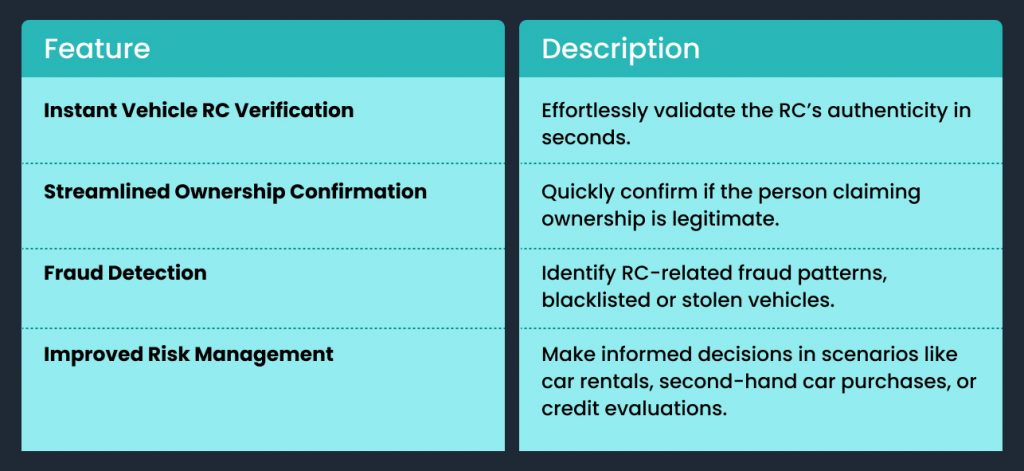In the context of ascertaining identity or ownership in sectors such as vehicle finance, logistics, insurance, and mobility services, knowing about the RC status, i.e., the Registration Certificate status, of a vehicle has become a building block of successful Know Your Customer (KYC) and risk assessment procedures.
An RC or Registration Certificate is a government document that confirms the registration of a motor vehicle with the Regional Transport Office (RTO). RC status indicates if the vehicle is active, inactive, blacklisted, stolen, hypothecated, or deregistered. Checking this status isn’t mere formality—it’s fraud prevention, regulatory compliance, and risk management assurance.
With the increasing need for quick, efficient, and digital verification procedures, websites such as Gridlines provide an API-based solution through which organizations can retrieve vehicle registration details in an instant and authenticate RC status with ease and certainty.
Also read : CKYC vs eKYC: Their Impact on the Financial Ecosystem
What is RC Status?
RC status refers to the legal status of the registration of a vehicle and may include statuses such as:
- Active – The vehicle is legally registered and can be driven on roads.
- Inactive – The registration is expired or pending renewal.
- Blacklisted – The vehicle is marked because of theft, unpaid loans, or legal offenses.
- Hypothecated – The vehicle has a loan/lease agreement with a financial body.
- Deregistered – The vehicle is no longer legally operational.
The status is important for stakeholders to use in verification of ownership, checking for encumbrances, and reducing risks.
How to check RC status
To verify your RC (Registration Certificate) status, you can make use of the Parivahan Sewa website or the mParivahan app. The status can also be verified at the Regional Transport Office (RTO) in your location.
Online (Parivahan Sewa Portal):
- Visit the Parivahan Sewa website.
- Click on “Online Services” followed by “Vehicle Related Services.”
- Choose your state from the drop-down menu.
- Select your RTO and then tap on “Know your application status” or something similar.
- Enter your vehicle registration number and captcha code.
- Tap “Submit” to see the status of your application.
mParivahan App:
- Download and install mParivahan app from Google Play Store or Apple App Store.
- Register or log in.
- Go to “Vehicle Related Services”.
- Tap on “Application Status”.
- Enter your vehicle registration number and other mandatory details.
- The app will show the RC status.
Why Is RC Verification Important in KYC and Onboarding?
Here’s why having knowledge of the RC status is important:
1. Avoiding Fraud and Misuse of Identity
False claims of ownership are prevalent in vehicle-based frauds. RC status verification prevents:
- Theft of or blacklisted vehicles
- Fake RC submissions while onboarding
- Tampered with documents of vehicles
2. Compliance with Regulations
Industries like auto finance, vehicle leasing, and insurance must comply with guidelines from the Ministry of Road Transport and Highways (MoRTH). Validating RC status ensures alignment with legal requirements.
3. Improved Risk Assessment
Whether you’re issuing a loan or onboarding a partner, RC data helps evaluate:
- Ownership authenticity
- Vehicle age and usage
- Liability risks and legal encumbrances
4. Streamlining Customer Onboarding
Real-time RC verification speeds up KYC, allowing companies to onboard customers or partners quicker and with more certainty.
How Gridlines Fixes the RC Verification Issue
Gridlines’ Vehicle RC Verification API simplifies the historically time-consuming process of RC verification using real-time, opt-in, and API-connected features. It integrates with a national vehicle database, fetching current RC information for immediate decision-making.
Gridlines Provides:
- Instant RC Validation : Fetch real-time validation of vehicle registration information from the country-wide database.
- Extensive Information Retrieval : Retrieve extensive information such as the name of the owner, registration number, date of registration, class of the vehicle, chassis/engine numbers, fuel type, etc.
- Fetch by Vehicle Registration Number : Verify instantly a vehicle’s RC status based on its registration number.
- Fetch by Chassis and Engine Number : When the RC number is not accessible, Gridlines supports searching via chassis and engine numbers—the perfect solution for insurers or lenders handling incomplete documentation.
- API Integration for Scalability : Simply integrate RC verification into your app or platform with Gridlines’ easy-to-use developer APIs.
Key Features of Gridlines’ RC API Solution

Use Cases Across Industries
- Auto Finance & Lending :The RC data is used by lenders to verify that the vehicle being presented as collateral is legitimate and unencumbered.
- Insurance : Insurance companies verify vehicle information before issuing or renewing policies, minimizing exposure to fraudulent claims.
3. Mobility & Delivery Services : Fleet owners, taxi aggregators, and delivery operators authenticate owner-driver vehicles prior to induction for protecting public safety and ensuring compliance.
4. Pre-Owned Vehicle Marketplaces : Used vehicle platforms authenticate a vehicle’s legitimacy and its ownership status prior to listing.
5. Logistics & Fleet Management : Authentications assist logistics companies in validating vehicle registrations prior to inducting them into service agreements.
Why Choose Gridlines?
Gridlines stands out due to its focus on precision, performance, and security. Here’s why businesses trust Gridlines for RC verification:
- Prompt RC Validation : Instant response from national transport databases ensures zero delays in verification workflows.
- Extensive Information Retrieval :Gain access to a rich dataset for decision-making—from owner identity to vehicle specs.
- Regulatory Compliance : Operates under guidelines from MoRTH, ensuring legality, security, and audit-readiness.
- Seamless API Integration : Designed for developers and enterprises alike, the Gridlines API can be embedded easily into CRMs, onboarding systems, or mobile apps.
- Intelligent Automation : Supports bulk verifications, scheduled checks, and smart triggers to streamline KYC pipelines.
Benefits for Businesses
- Faster Customer Onboarding – Speed up account or partner creation.
- Reduced Risk – Avoid onboarding vehicles or users linked to fraud.
- Better Compliance – Stay ahead of industry-specific KYC mandates.
- Operational Efficiency – Eliminate manual verification tasks.
- Enhanced Trust – Build transparency with customers, partners, and investors.
- This page gives you detailed technical documentation and demo access to integrate the RC verification capability into your onboarding process today.
Offerings by Gridlines
- Fetch RC detailed
- Fetch vehicle reg number by chassis
- Fetch RC detailed by challan
- Fetch RC lite
- Fetch E challan
Final Thoughts
Verifying a vehicle’s RC status is no longer optional—it’s essential. Whether you’re a fintech offering auto loans, an insurer issuing policies, or a fleet manager onboarding a driver, RC verification helps eliminate fraud, stay compliant, and make confident business decisions.





Leave a Reply